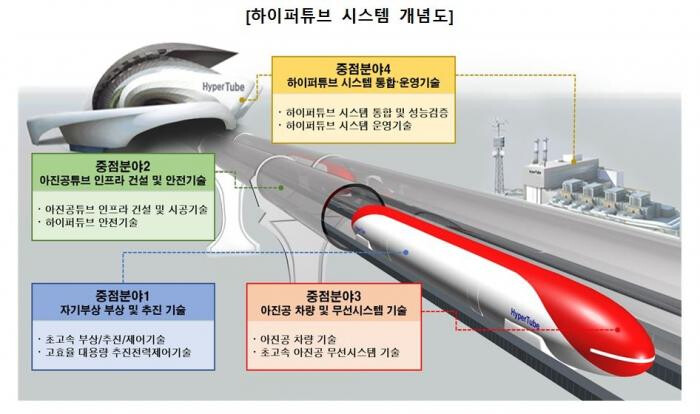
Seoul, South Korea – The South Korean government has announced a significant push towards realizing ultra-high-speed ground transportation with the formal commencement of research and development into core technologies for the Hyperloop system. The ambitious project envisions reducing travel time between Seoul and the southern port city of Busan to a mere 16 minutes, a prospect that could revolutionize domestic transportation.
The Ministry of Land, Infrastructure and Transport (MOLIT) revealed its commitment to this next-generation transit solution, stating that 12.7 billion won (approximately $9.5 million USD) will be invested over the next three years, from 2025 to 2027. The Korea Railroad Research Institute (KRRI) will spearhead this critical research endeavor, focusing initially on the intricate magnetic levitation and propulsion systems essential for Hyperloop operation.
The Hyperloop concept involves levitating and propelling passenger or cargo pods at extraordinary speeds within a partially evacuated tube (operating at pressures between 0.001 and 0.01 atmospheres). This near-vacuum environment significantly reduces air resistance, allowing for velocities exceeding those of commercial aircraft. The technology promises a mode of transport that is not only faster but also more environmentally sustainable and less susceptible to adverse weather conditions compared to air travel. The term 'Hyperloop' is often used interchangeably with 'Hyperloop.'
Upon successful commercialization, Hyperloop trains are projected to achieve maximum speeds of 1200 kilometers per hour (approximately 745 miles per hour). This is roughly four times the operational speed of South Korea's existing high-speed KTX trains (300 km/h). Consequently, a journey from Seoul to Busan, which currently takes approximately 1 hour and 52 minutes by KTX, could be reduced dramatically to an estimated 16 minutes and 15 seconds of non-stop travel at peak velocity.
The realization of a functional Hyperloop system necessitates advancements across several key technological domains. These include not only sophisticated magnetic levitation and propulsion mechanisms but also the innovative design and construction of near-vacuum tubes capable of maintaining the required atmospheric conditions. Furthermore, the development of lightweight yet robust vehicle designs and advanced control systems for safe and efficient high-speed operation are crucial. The current government funding is specifically directed towards the intricate challenges of magnetic levitation and propulsion, aiming to establish the fundamental technologies for Hyperloop-exclusive tracks and comprehensive operational control systems.
To ensure the effective execution of this ambitious project, MOLIT is establishing a dedicated 'Hyperloop Core Technology Development Project Task Force (TF).' This task force will be chaired by the Director-General of the Railway Bureau and will include expertise from the private sector. Notably, leading construction firm GS E&C, the Korea National University of Transportation, and the Korea Electrotechnology Research Institute (KERI) will collaborate on the development of track-related technologies.
Yoon Jin-hwan, the Director-General of MOLIT's Railway Bureau, expressed optimism about South Korea's potential in this emerging field. "Having transitioned from a high-speed rail technology importer to an exporter of our own technology within two decades, South Korea is poised to take a leading role in the global railway competition market through the development of the 'dream railway' technology, the Hyperloop," stated Director-General Yoon.
This initiative underscores South Korea's commitment to innovation in transportation and its ambition to be at the forefront of next-generation mobility solutions. While significant technological and engineering hurdles remain, the government's dedicated investment signals a strong intent to make the futuristic vision of ultra-fast terrestrial travel a reality.
[Copyright (c) Global Economic Times. All Rights Reserved.]






























